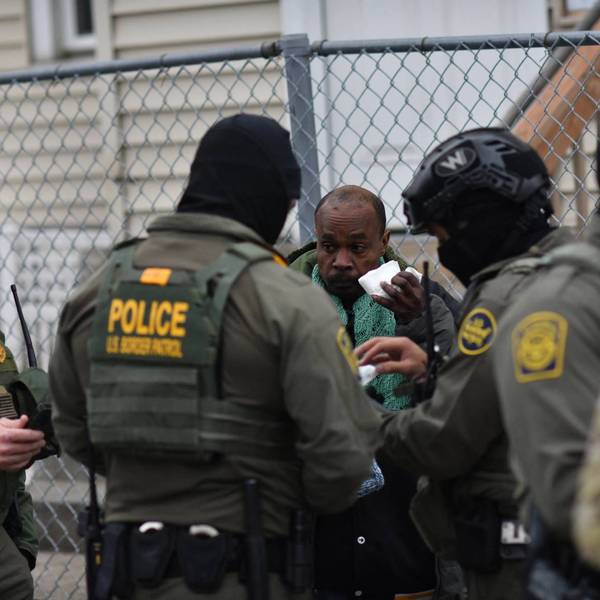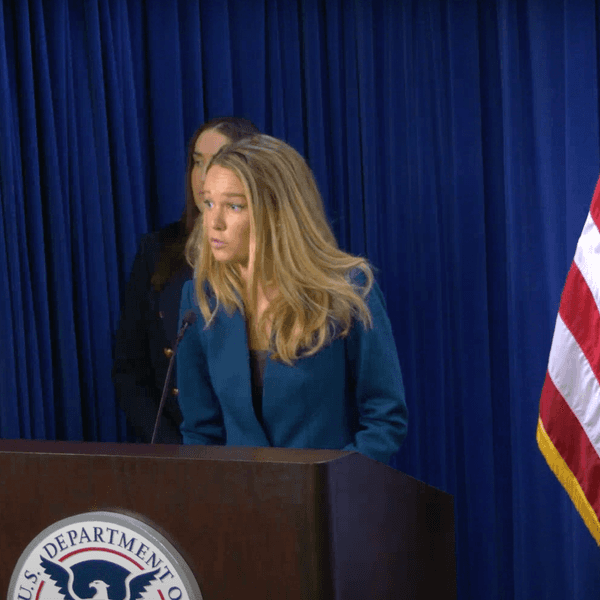FBI 'Mapping': Racial Profiling on a People-Wide Scale
A Black Agenda Radio commentary
Until the events of 9/11, Black America seemed to be winning lots of battles in the fight against racial profiling. The term "Driving While Black" had become almost a household word due to heavy media exposure of wildly disproportionate stops of Black drivers by police on Interstate highways. Racial profiling had become politically and socially unacceptable, with few public advocates even among law and order Republicans. And then the Twin Towers came down. Almost instantaneously, racial profiling was back, with a vengeance - directed most dramatically against people who "appeared" to be Muslim, whatever that looks like, but with renewed vigor against African Americans, the historical targets. The FBI, which was never a respecter of the rights of darker peoples, repositioned itself to aggressively pre-empt any threat to national security. That means going after people even when there is no evidence of a crime. Although it remained against the rules for FBI agents to launch investigations based solely on race, religion of ethnicity, those factors could be taken into account. It was a loophole big enough to drive a busload of Knights of the Ku Klux Klan through. By asserting that certain racial, religious and ethnic groups - Blacks, Muslims (especially Black Muslims) and Latinos - were more prone to crime and acts of terror, the FBI cold justify all manner of methods to massively penetrate these groups in the interest of national security.
The vocabulary changed to suit the mission. Ethnic, racial and religious communities became "domains" in FBI parlance, large geographic and social spaces in which national security demanded that the Bureau make itself acutely "aware." Thus, the new strategy was called "domain awareness" - meaning, the FBI's job was to learn everything about the people who lived in these ethnic, religious and racial "domains." All that was required to launch massive intelligence gathering campaigns against, say, Black people in the state of Georgia, Arabs in the Detroit area, Chinese and Russians in the San Francisco Bay Area, or almost any group in New York City, was the invocation of a vague criminal or national security "threat."
Like magic, threats started appearing all over the place. In October 2009, the Atlanta office of the FBI sent out a threat "alert" about supposed "Black Separatist" groups. It turned out that the alert involved peaceful protests and support of a congressional candidate, but the FBI set about collecting information on the growth of the entire Black population in the Atlanta area, the better to understand the "domain." The FBI has used the presence of street gangs like MS13 in some Latino communities to launch domain-wide dragnets of information on area Hispanic populations. Muslims of any extraction - but especially Black American Muslims - are considered domains worthy of endless mapping. According to the ACLU, which is urging people to tell the FBI "Don't Map Me or My Community," the Bureau is studying racial and ethnic "behaviors." That means "behaving while Black" - or behaving while Latino, or behaving while Muslim. The FBI also studies racial, ethnic and religious "facilities" - that is, the places where people...exist. The ACLU says the FBI's own behavior is unconstitutional. It also seems very much like the FBI is preparing to put the people it is studying under some kind of siege.
An Urgent Message From Our Co-Founder
Dear Common Dreams reader, The U.S. is on a fast track to authoritarianism like nothing I've ever seen. Meanwhile, corporate news outlets are utterly capitulating to Trump, twisting their coverage to avoid drawing his ire while lining up to stuff cash in his pockets. That's why I believe that Common Dreams is doing the best and most consequential reporting that we've ever done. Our small but mighty team is a progressive reporting powerhouse, covering the news every day that the corporate media never will. Our mission has always been simple: To inform. To inspire. And to ignite change for the common good. Now here's the key piece that I want all our readers to understand: None of this would be possible without your financial support. That's not just some fundraising cliche. It's the absolute and literal truth. We don't accept corporate advertising and never will. We don't have a paywall because we don't think people should be blocked from critical news based on their ability to pay. Everything we do is funded by the donations of readers like you. Will you donate now to help power the nonprofit, independent reporting of Common Dreams? Thank you for being a vital member of our community. Together, we can keep independent journalism alive when it’s needed most. - Craig Brown, Co-founder |
Until the events of 9/11, Black America seemed to be winning lots of battles in the fight against racial profiling. The term "Driving While Black" had become almost a household word due to heavy media exposure of wildly disproportionate stops of Black drivers by police on Interstate highways. Racial profiling had become politically and socially unacceptable, with few public advocates even among law and order Republicans. And then the Twin Towers came down. Almost instantaneously, racial profiling was back, with a vengeance - directed most dramatically against people who "appeared" to be Muslim, whatever that looks like, but with renewed vigor against African Americans, the historical targets. The FBI, which was never a respecter of the rights of darker peoples, repositioned itself to aggressively pre-empt any threat to national security. That means going after people even when there is no evidence of a crime. Although it remained against the rules for FBI agents to launch investigations based solely on race, religion of ethnicity, those factors could be taken into account. It was a loophole big enough to drive a busload of Knights of the Ku Klux Klan through. By asserting that certain racial, religious and ethnic groups - Blacks, Muslims (especially Black Muslims) and Latinos - were more prone to crime and acts of terror, the FBI cold justify all manner of methods to massively penetrate these groups in the interest of national security.
The vocabulary changed to suit the mission. Ethnic, racial and religious communities became "domains" in FBI parlance, large geographic and social spaces in which national security demanded that the Bureau make itself acutely "aware." Thus, the new strategy was called "domain awareness" - meaning, the FBI's job was to learn everything about the people who lived in these ethnic, religious and racial "domains." All that was required to launch massive intelligence gathering campaigns against, say, Black people in the state of Georgia, Arabs in the Detroit area, Chinese and Russians in the San Francisco Bay Area, or almost any group in New York City, was the invocation of a vague criminal or national security "threat."
Like magic, threats started appearing all over the place. In October 2009, the Atlanta office of the FBI sent out a threat "alert" about supposed "Black Separatist" groups. It turned out that the alert involved peaceful protests and support of a congressional candidate, but the FBI set about collecting information on the growth of the entire Black population in the Atlanta area, the better to understand the "domain." The FBI has used the presence of street gangs like MS13 in some Latino communities to launch domain-wide dragnets of information on area Hispanic populations. Muslims of any extraction - but especially Black American Muslims - are considered domains worthy of endless mapping. According to the ACLU, which is urging people to tell the FBI "Don't Map Me or My Community," the Bureau is studying racial and ethnic "behaviors." That means "behaving while Black" - or behaving while Latino, or behaving while Muslim. The FBI also studies racial, ethnic and religious "facilities" - that is, the places where people...exist. The ACLU says the FBI's own behavior is unconstitutional. It also seems very much like the FBI is preparing to put the people it is studying under some kind of siege.
Until the events of 9/11, Black America seemed to be winning lots of battles in the fight against racial profiling. The term "Driving While Black" had become almost a household word due to heavy media exposure of wildly disproportionate stops of Black drivers by police on Interstate highways. Racial profiling had become politically and socially unacceptable, with few public advocates even among law and order Republicans. And then the Twin Towers came down. Almost instantaneously, racial profiling was back, with a vengeance - directed most dramatically against people who "appeared" to be Muslim, whatever that looks like, but with renewed vigor against African Americans, the historical targets. The FBI, which was never a respecter of the rights of darker peoples, repositioned itself to aggressively pre-empt any threat to national security. That means going after people even when there is no evidence of a crime. Although it remained against the rules for FBI agents to launch investigations based solely on race, religion of ethnicity, those factors could be taken into account. It was a loophole big enough to drive a busload of Knights of the Ku Klux Klan through. By asserting that certain racial, religious and ethnic groups - Blacks, Muslims (especially Black Muslims) and Latinos - were more prone to crime and acts of terror, the FBI cold justify all manner of methods to massively penetrate these groups in the interest of national security.
The vocabulary changed to suit the mission. Ethnic, racial and religious communities became "domains" in FBI parlance, large geographic and social spaces in which national security demanded that the Bureau make itself acutely "aware." Thus, the new strategy was called "domain awareness" - meaning, the FBI's job was to learn everything about the people who lived in these ethnic, religious and racial "domains." All that was required to launch massive intelligence gathering campaigns against, say, Black people in the state of Georgia, Arabs in the Detroit area, Chinese and Russians in the San Francisco Bay Area, or almost any group in New York City, was the invocation of a vague criminal or national security "threat."
Like magic, threats started appearing all over the place. In October 2009, the Atlanta office of the FBI sent out a threat "alert" about supposed "Black Separatist" groups. It turned out that the alert involved peaceful protests and support of a congressional candidate, but the FBI set about collecting information on the growth of the entire Black population in the Atlanta area, the better to understand the "domain." The FBI has used the presence of street gangs like MS13 in some Latino communities to launch domain-wide dragnets of information on area Hispanic populations. Muslims of any extraction - but especially Black American Muslims - are considered domains worthy of endless mapping. According to the ACLU, which is urging people to tell the FBI "Don't Map Me or My Community," the Bureau is studying racial and ethnic "behaviors." That means "behaving while Black" - or behaving while Latino, or behaving while Muslim. The FBI also studies racial, ethnic and religious "facilities" - that is, the places where people...exist. The ACLU says the FBI's own behavior is unconstitutional. It also seems very much like the FBI is preparing to put the people it is studying under some kind of siege.

